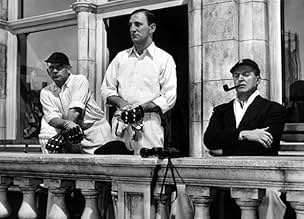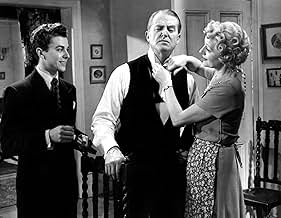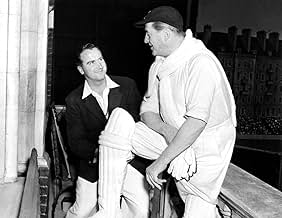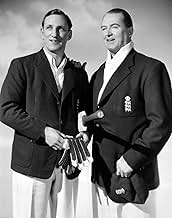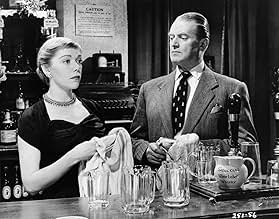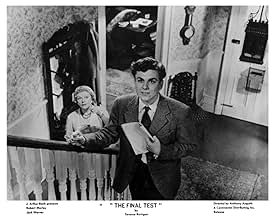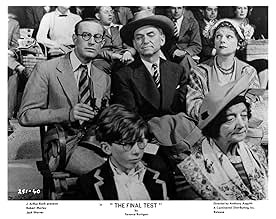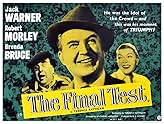Adicionar um enredo no seu idiomaSam Palmer is a cricketer about to play the final test match of his career. His schoolboy son Reggie is a budding poet who disappoints him by not attending the penultimate day's play. Unexpe... Ler tudoSam Palmer is a cricketer about to play the final test match of his career. His schoolboy son Reggie is a budding poet who disappoints him by not attending the penultimate day's play. Unexpectedly, Reggie is invited to the home of poet and writer Alexander Whitehead. Reggie fears... Ler tudoSam Palmer is a cricketer about to play the final test match of his career. His schoolboy son Reggie is a budding poet who disappoints him by not attending the penultimate day's play. Unexpectedly, Reggie is invited to the home of poet and writer Alexander Whitehead. Reggie fears he will also miss the final day--and therefore Sam's last innings--but it turns out that ... Ler tudo
- Self - Cricket commentary by
- (narração)
- Cricket Match Spectator
- (não creditado)
- Frank Weller
- (não creditado)
Avaliações em destaque
Quickly filmed after being one of the earliest British TV plays by an established writer, "The Final Test" is a cheap and cheerful comedy. Documentary footage of real play at the Oval, South London, is hardly up to "Zelig" standards in melding into the studio shots. The film stocks do not match, and the crowd's rush into the ground is evidently back-projected. The setting is less grand than one associates with Rattigan. It is Cowardesque in the vein of "This Happy Breed", with a sauce bottle on the dinner table: the hero, Sam Palmer, is a professional batsman who has done well enough to give his son a fee-paying education. The only "posh" character besides Wattis is Robert Morley's pompous poet and playwright, whom the literary-minded son would rather visit than watch his dad play his last innings against the Australian tourists. Luckily Morley proves to be a cricket maniac and all ends well.
Jack Warner's remarkable, belated rise from fairly blue music hall comic and Maurice Chevalier impersonator to one of Britain's leading character actors is consolidated here. He can be humorous, gruff, judicious... and all in the same scene if required. There is no trace of the over-expressiveness of so many comedians trying to act. Though pushing 60, Warner looks no older than the real doyen of the English side, Cyril Washbrook, who along with a handful of colleagues nervously plays himself (no role is harder for a non-pro). The widowed Warner has a fancy for a barmaid at his local pub, the gaunt Brenda Bruce, and he has his own retirement dilemmas to resolve: should he marry a woman who may have a past, and should he take a job coaching boys at Eton when his son is about to go to Oxford and mingle with Etonians on level terms?
"The Final Test" therefore has a few gentle remarks to drop about changing social values and snobberies in post-war Britain. Sam's captain, Len Hutton, urges him not to fuss so much about the pecking order: an amusing way of using a real-life character, since the great Yorkshireman was England's first professional cricket captain and would soon be knighted. Morley's TV play "Following a Turtle to My Father's Tomb", which Sam's son watches in rapture and which drives Sam out to the pub, is a spoof of the middlebrow poetic drama (TS Eliot, Christopher Fry) then in vogue, which Rattigan did not admire. One line, "the great dome of discovery that men call the sky", takes off the exhibit of that name in the recent Festival of Britain.
The deserved rehabilitation of Rattigan, with the likes of David Mamet doing him homage, gives fresh interest to a script which takes the boulevard playsmith outside his usual range. No doubt the film technicians' union approved the democratic spirit, since this was one of its occasional efforts, via ACT Films, at keeping its members in work. Director "Puffin" Asquith, though the son of an earl and ex-prime minister, was a keen union activist. Sam Palmer was Jack Warner's last big film part for a decade. He was soon to resurrect his slain copper from "The Blue Lamp" and become TV's most famous PC in "Dixon of Dock Green."
Harold Pinter, himself a keen amateur cricketer, wrote cricketing scenes into some of his film-scripts, such as "Accident" and "The Go-Between", but in neither case is the sport the main focus of the film. "The Final Test" from 1953 is about the only British film I can think of that focuses mainly on cricket. The script was written by Terence Rattigan, another amateur cricketer, and directed by Anthony Asquith, who had collaborated with Rattigan on a number of other films, including "French without Tears", "The Winslow Boy" and "The Browning Version".
Despite Rattigan's cricketing background, this is as much a human drama as a sporting one, and for most of the time the drama is not centred upon events on the pitch. England are playing Australia in the fifth and final test of an Ashes series at the Oval. The match seems certain to end in a draw; Australia have made a huge first-innings score, which England look likely to match, and a whole day's play has been lost to rain. Even if one side or the other can conjure up an unlikely victory, that will not affect the result of the series, which it is implied Australia have already won.
Several England cricketers- Len Hutton, Denis Compton, Alec Bedser, Godfrey Evans, Jim Laker and Cyril Washbrook- appear as themselves. (Hutton's part is quite a large one). The main character, however, is a fictitious one, Sam Palmer, once a great batsman but now coming to the end of his career. (Rattigan seems to have based him on the legendary Australian batsman Don Bradman and the events of his final Test in 1948). Sam knows that this will be his last appearance for England and wants his teenage son Reggie to be at The Oval to watch him. Reggie, however, has little interest in cricket; he sees himself as a budding intellectual and his great passion is for poetry. He does not want to be at The Oval because he has a chance to meet his great hero, the poet and dramatist Alexander Whitehead. When the two meet, however, Reggie is surprised to discover that Whitehead is himself a cricket fanatic. Another plot line concerns the love-triangle which develops between Sam, his young England team-mate Frank Weller and Cora, the barmaid at Sam's local pub.
The weakest thing about the film is, in my opinion (and, it would seem, in the opinion of a number of other reviewers as well) is the miscasting of Jack Warner as Sam. Sam is probably supposed to be in his early forties, but Warner would have been 58 in 1953, far too old for a professional cricketer. He doesn't even look younger. I like the suggestion of another reviewer who thought that John Mills (45 at the time, and slimmer than Warner) would have been a good match for the role. The relationship between Sam and Cora would also have seemed more convincing if he had not looked old enough to be her father.
Warner had form for this sort of thing. Three years earlier he had also looked too old for a part when, at 55, he played a police constable in "The Blue Lamp", but his advancing years did not prevent his character, George Dixon, from being resurrected in the TV show "Dixon of Dock Green". Warner went on playing the character until he was 80!
There is an amusing contribution from Robert Morley as Whitehead, who despite his literary fame comes across as a pompous, self-important jackass (like a lot of characters Morley played), partially redeemed by his genuine love of cricket. I wondered if Rattigan was using the character to settle scores with some rival playwrights; we see one of Whitehead's plays being broadcast on television, an obvious parody of the verse drama of T S Eliot and Christopher Fry which was popular around this time.
In 1953 Rattigan was at the height of his fame; he was later to be eclipsed by the rise of the theatrical "Angry Young men" such as John Osborne, but he had a gift for writing dialogue and for his ability to create believable human relationships, such as the one between Sam and Reggie in this film. Both end up appreciating and sympathising with the other's position more than they would have thought possible at one time. With a better leading man my mark might well have been higher. 7/10.
This is a gentle comedy with a touch of drama. If you want to see how comedy works (and you understand cricket) watch the first 5 minutes. Senator Stanley Maxted arrives in England and makes his way to the Oval where he poses a few questions to deadpan Richard Wattis. The questions are standard cricketing enquiries (you mean they play for 5 days and it might still be a draw?) which could be cheesy but the delivery and Wattis' "matter of fact" responses make you laugh.
Sam's cricketing prowess does not extend to his son who is more interested in poetry and this forms the backbone of the movie – does the son care enough about dad to watch his final innings? At the same time, does dad care enough about his son to appreciate his interests.
Sam not only gives the umpire a lift to the ground but entertains him for dinner the night before (they wouldn't allow it these days you know). Sam also pops down to the local for a drink around closing time during the middle of the game - but he only drinks lemonade so that's alright then. Robert Morley (wearing a rather fetching jump suit) spices up the last third of the film as a vain, muddled poet.
His son wriggles out of watching his fathers final match in order to visit his own hero a poet played by the wonderful Robert Morley.
It is a charming light comedy which deals with the father/son relationship. Morley steals the show, as expected and the ending is suitable happy.
The real tragedy is that this is practically the only film to feature cricket when dozens have been made about baseball. Cricket contains all the metaphor and allegories that exist about life and the universe. In fact it is itself a branch of philosophy which can teach humankind the true path to enlightenment. It is not just an interesting way to hit a ball with a stick!
This film should have been the thin end of a very large and wonderful wedge. John Boormans "Hope and Glory" contains an excellent cricket scene. If anyone can suggest any other films with a cricketing theme I would be pleased to hear from you.
Você sabia?
- CuriosidadesIn the opening scene, shot in London Waterloo railway station, the film of the locomotive arriving at the platform is flipped left-to-right, as revealed by the mirror-reversed number on the side of the locomotive cab. This was most likely intentional, so that in the next shot the platform is on the same side of the train.
- Erros de gravaçãoAt the end of the first day of England's innings it is said that they scored 320. The next day on the radio, John Arlott says 283.
- Citações
Reggie Palmer: I'm afraid I don't awfully like cricket.
Alexander Whitehead: Don't you really? I have heard of such people.
- ConexõesRemade as The Final Test (1961)
Principais escolhas
Detalhes
- Data de lançamento
- País de origem
- Idioma
- Também conhecido como
- Poslednja provera
- Locações de filme
- Pinewood Studios, Iver Heath, Buckinghamshire, Inglaterra, Reino Unido(studio: made at Pinewood Studios, England)
- Empresas de produção
- Consulte mais créditos da empresa na IMDbPro
- Tempo de duração
- 1 h 30 min(90 min)
- Cor
- Proporção
- 1.37 : 1

